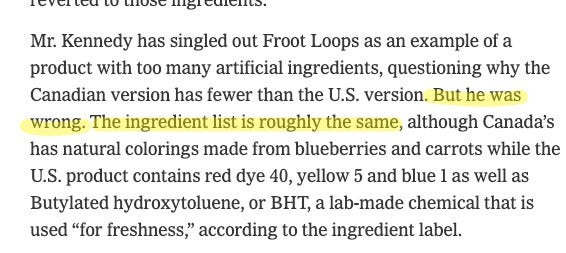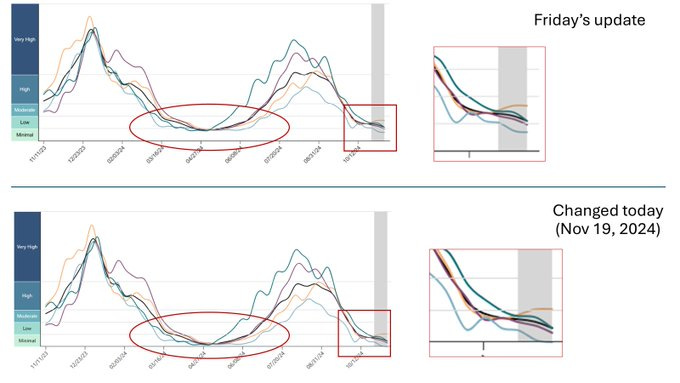Unpopular Science 241124 Links
Unpopular and underreported topics for personal scientists
This week’s collection of links that I found interesting:
Bad science
NYTimes : Kennedy's Vow to Take on Big Food includes this gem:
Okay, it's not fair to highlight the original version of the article, which was later corrected:
Mr. Kennedy has singled out Froot Loops as an example of a product with too many ingredients. In an interview with MSNBC on Nov. 6, he questioned the overall ingredient count: “Why do we have Froot Loops in this country that have 18 or 19 ingredients and you go to Canada and it has two or three?” Mr. Kennedy asked.
He was wrong on the ingredient count, they are roughly the same. But the Canadian version does have natural colorings made from blueberries and carrots while the U.S. product contains red dye 40, yellow 5 and blue 1 as well as Butylated hydroxytoluene, or BHT, a lab-made chemical that is used “for freshness,” according to the ingredient label.
A correction was made on Nov 17
Because of an editing error, an earlier version of this article incorrectly described Mr. Kennedy’s recent comments on Froot Loops. He was comparing the total number of ingredients in the U.S. and Canadian versions of the cereal, not the number of artificial ingredients.
In other words, the NYTimes is technically correct that RFKjr "was wrong", but seriously, is that an accurate summary of the situation?
We’ve been referring to it as “Unscientific” American, but now the chief editor has left. Laura Helmuth, “who turned America's oldest magazine into her personal political blog of bigotry and hate”, left behind a trail of appallingly unscientific articles, documented this week in Quillette by Michael Shermer, who himself wrote a column for the magazine for 18 years. He concludes with a possible upside:
But the social environment is rapidly changing. Thanks to Donald Trump’s election, together with relentless pushback from political centrists and old-school liberals who are sick of being harangued by overzealous activists who accuse anyone who disagrees with them of bigotry, the pendulum may at long last be starting to swing back towards normalcy. Election postmortems and surveys have consistently identified the fact-free ideological capture of the Democratic party as a major factor in their defeat. The Left is in dire need of a course correction. Will that happen? Given what we know about the power of irrational belief, I am not at all confident that it will. Let’s hope I’m wrong, though—not only for the sake of the future of a once-great magazine, but for the sake of the American nation.
Speculative Science
Andrew Cutler’s Eve Theory of Consciousness is a Seeds of Science essay that argues for recursion as the spark that induced humans to develop advanced cultures. The spark was lit, he speculates, by snake venom and the psychedelic experience it engendered in somebody, probably a woman.
Quantum Computing has stalled, says Wm Briggs, due to impossible-to-surmount issues with how to represent the information:
Scott Locklin’s lovely rant against the idea of quantum computing, I thought I’d use the subject as an excuse to explain why quantum computing has stalled. (Physics has also gone off into other preposterousities, like Many Worlds (blog/Substack).)
Let’s start with “The Case Against Quantum Computing” by Mikhail Dyakonov (Locklin cites this). I urge you to read it all, since I will only pull a limited summary.

Health
NYTimes warns about uploading health data to Grok, without of course mentioning the far more frequent uploading that happens with Google searches or Facebook posts. I guarantee you: Google knows way more about your health than Elon does. They include the obligatory quotes from "medical ethics experts" who make vague warnings about how maybe, like, Elon will sell your data to an insurance company that will cut your coverage. Oh wait, that's illegal, so maybe—I don't know—somebody else will do something bad. Not sure what, but hey you can't trust Elon.
Meanwhile, no mention is made of the far, far greater problem: of people without access to trustworthy doctors, either because—yes—the medical system is broken and they can't afford it, or—even more common—doctors themselves don't agree. ChatBots like Grok are a godsend to people who just want to level the playing field in the battle against medical ills that nobody really knows how best to treat.
Who do you trust more for keeping your food safe: Costco? or FDA?
Costco “recalled” almost 80,000 pounds of butter because the labels didn’t explicitly warn that it contains milk. FDA didn’t force them, or even request this. Costco did it because they want to build their reputation as a company that takes food safety seriously
from Adam Mastroianni
This guy on Reddit claims to have cured his wife’s 20-year migraine by cleaning their HVAC system. If even one other person heals their headaches by dusting their ducts, this is way more impact than the average scientific paper.
The CDC “quietly” changed the Y-axis on its COVID dashboard in a way that makes it look like transmission is not that bad. I personally don’t think this is a big deal, but it’s a reminder that you can’t base your decision-making on statistics that can change.
Culture
Elon Musk tweets in Japanese! 侘び寂び (wabi-sabi is an expression that means finding beauty in imperfection)
Apple’s list of top 2024 podcasts starts with the NYTimes The Daily news and Crime Junkie followed by Joe Rogan. I was surprised that the most-listened episode was one from Crime Junkie that beat out Rogan’s interview with Trump. Huberman Lab is the only health- or science-related on in the top (no Lex Fridman, no Dwarkesh).
The median age for TNT and Bravo viewers is 56, for HGTV it is 66, and even the once-youthful MTV’s median-age viewer is 51, according to Nielsen data. The cable news audience is even older, with MSNBC’s median age at 70, Fox News’s at 69 and CNN’s, 67. Among broadcasters, CBS’s median age is 64 and ABC’s is 66.
Top-viewed Netflix productions around the world.
The major exception is Japan, in which 17/20 top productions are Japan-made.



